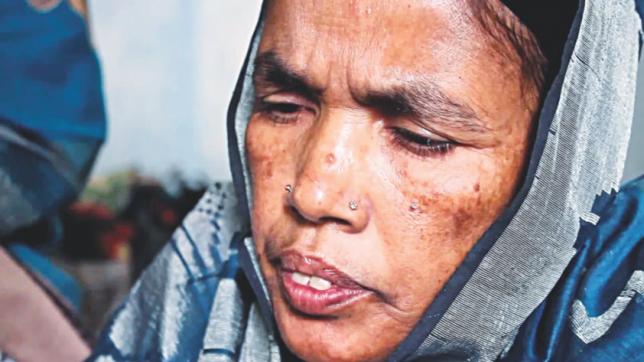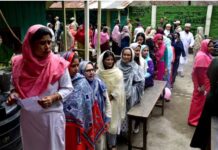The passing away of Bir Protik Taramon Bibi quietly in her home in Rajipur Upazila, at age 61, only 16 days before the commemoration of Victory Day, is truly a tragedy for us. For she was one of our few living heroes who could tell the tale of a freedom fighter, battling against a ferocious enemy, far less equipped in terms of arms, training or experience, far more passionate in the steadfast determination to free one’s motherland from the clutches of oppression.
We don’t know whether she received the best medical treatment for her respiratory problems or diabetes. We do not know what hardship she suffered all those years after the war when she remained traceless until a determined researcher found her. It is tragic because there are so few women freedom fighters whom we know of and who have been able to share their stories, so few who have been recognised for their truly heroic deeds.
And Taramon Bibi, a restless tomboy, managed to convince her mother to let her, a lanky young girl in her teens, to join the war for freedom. In an interview Taramon describes how she met Muhib Habildar, a freedom fighter, her mentor and godfather, who persuaded her to help his fellow Muktijodhhas in a camp in her village home Shankar Madhabpur Kurigram.
Her initial job was to cook for the freedom fighters in the camp which she was happy to do but soon her comrades realised she was ready to take on far more serious tasks. Pretending to be a mentally challenged woman by smearing dirt on her hair, Taramon would go near the enemy camp to get information for her comrades. She would nimbly climb the betel nut trees and use her binoculars to spot the approaching enemy and alert her comrades. Impressed by her fearlessness, Muhib started to train her in how to use a rifle and stein gun—training that came to great use in various operations.
The memory of the first time she went into direct combat was always very vivid for Taramon. During one of her vigils she spotted a gunboat carrying the Pak army heading towards where they were located. Taramon got prepared for combat with her comrades, and together, they succeeded in getting rid of the enemy. After that, Taramon had to fight with arms on many occasions and was often praised by the other Muktijoddhas for being a good marksman. In those days, she never thought about the risks involved in what she was doing. “We were fighting to free our country,” she said in an interview, “the last thing on my mind was worrying about my own safety.”
She was totally committed to the cause of freeing her motherland just like so many other men and women at the time. Once when Taramon and her camp mates were hiding in the bunkers when the enemy changed their strategy and started an air-bombing onslaught. The Pak army raided the camp a few times and hurled bombs killing several people. But fortunately, Taramon escaped death. She had been in Sector 11 under the leadership of Sector Commander Abu Taher, Bir Uttam.
Bangabandhu Sheikh Mujibur Rahman’s government honoured her with the Bir Protik title in 1973 for her courageous role in resisting the Pakistan occupation forces with weapons. She had been given an award of gallantry yet she had no idea she had received such an honour. After the war, nobody knew of her whereabouts.
It was in 1995, 24 years after she had helped to liberate her country, that a researcher Bimal Kanti Dey found her and she received her title Bir Protik and a medal of honour from the government. Although she had helped to win a war, her personal life was one of struggle with her husband, a landless farm labourer, and two children to raise, while she battled with tuberculosis.
She was one of the two gallantry award-winning women freedom fighters. Taramon was laid to rest in her family graveyard at Kacharipara in Rajibpur with state honours. It was a befitting farewell to a brave hero who passed most of her life like many of her other fellow Muktijoddhas, in financial hardship and poor health, but unwavering in their love for their motherland.
by










